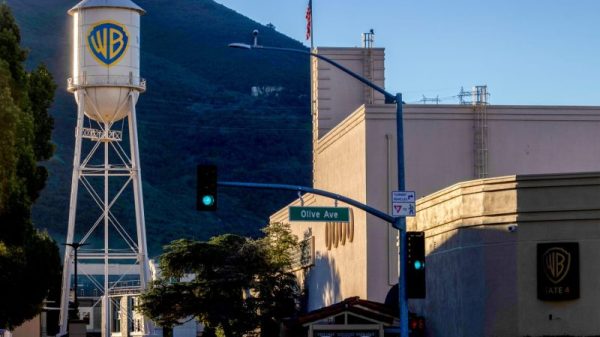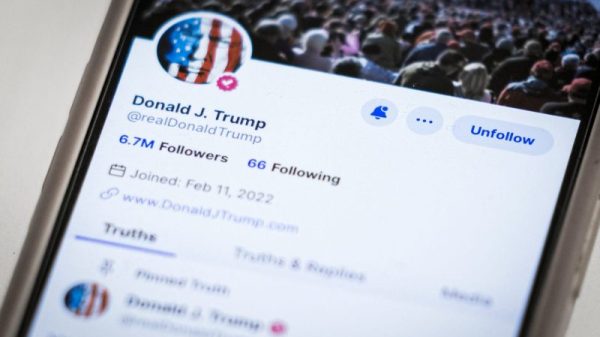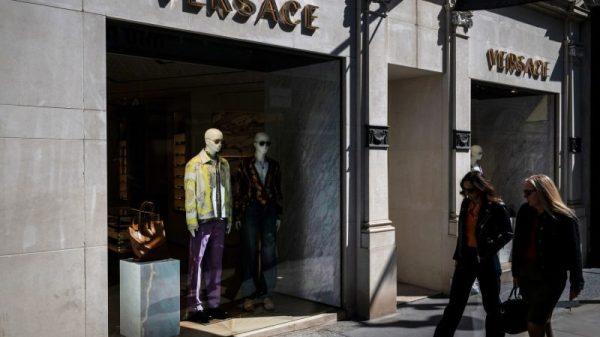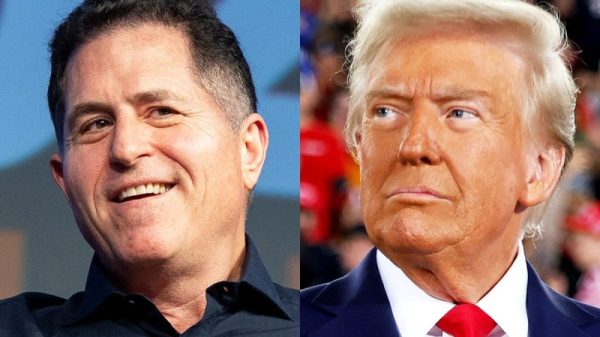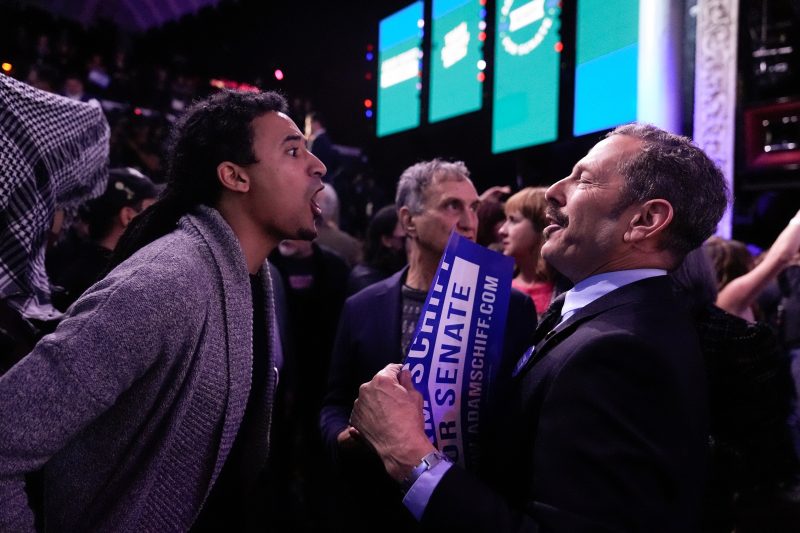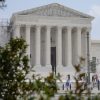Early this month, protesters confronted Rep. Alexandria Ocasio-Cortez (D-N.Y.) at a Brooklyn theater, demanding that she call the Israel-Hamas war “a genocide.”
The next day, protesters shouting “Cease-fire now!” and “Let Gaza live!” interrupted the Senate primary victory speech of Rep. Adam Schiff (D-Calif.), forcing him to cut short his ebullient remarks.
And before the annual State of the Union address, protesters wearing black shirts blaring “Biden’s legacy = genocide” and carrying oversized banners locked arms to shut down a swath of Pennsylvania Avenue — forcing President Biden’s motorcade to take an alternate route to the Capitol to avoid the demonstration.
Ever since Hamas’s deadly Oct. 7 attack on Israel and Israel’s military response, protesters calling for an immediate cease-fire and an end to the war in Gaza have become a hallmark of Democratic events, with demonstrators confronting everyone from Biden and Vice President Harris to Cabinet secretaries and members of Congress.
The sustained and ubiquitous nature of the protests have distracted from the message that Democrats are hoping to send and highlighted a key vulnerability that Democrats fear could hurt them in the November election.
“The persistence of these is really striking, and that’s probably why it’s really making it a headache for anyone in a position of authority at this point, and it’s the Democrats right now,” said Dave Clark, professor of political science of Binghamton University. “So many times these things are difficult to sustain from an organizational standpoint and they drift off into nothingness, and they have not done that. They really have been sustained since the October 7th attack.”
Particularly ominous for Biden and Democrats is not just the fact of the protesters and near-constant disruptions, but what it could portend in November: Many of the protesters have emerged from the ranks of their liberal base, including young voters. In last month’s Democratic primary election in Michigan, which has a large Arab American population, more than 100,000 voters chose “Uncommitted” — a pointed signal intended to convey they were unhappy with Biden’s Israel-Hamas war policies.
A March Fox News poll, for instance, asked registered voters whether they approved or disapproved of how Biden was handling the war between Israel and Hamas. Overall, among Democrats, a narrow 52 percent majority approved and 44 percent disapproved — much worse than his overall approval rating among Democrats, where 81 percent approved of how he was doing as president.
And a January AP-NORC poll found 63 percent of Democrats saying the military response from Israel in the Gaza Strip has “gone too far,” compared to 24 percent who said it has been about right and 9 percent who said Israel has not gone far enough.
Some Democrats are also growing anxious about the party’s convention this summer in Chicago and mass protests interfering with the four-day event. Demonstrators always gather outside Democratic and Republican conventions, but party rank-and-file have quietly expressed concern about major disruptions this year, particularly related to Israel and Gaza. The convention will have enhanced security because it is designated as a national security special event, and organizers say they are confident they can balance First Amendment activity and safety concerns.
The president, a staunch supporter of Israel, supports a temporary cease-fire in Gaza in exchange for the release of hostages still being held by Hamas. He has also become increasingly critical of Israeli leaders for not allowing more aid into Gaza, where more than 30,000 Palestinians have been killed, according to the Gaza Health Ministry, and hundreds of thousands more are at risk of famine.
Protesters have a host of demands, including a permanent cease-fire and an end of U.S. military support to Israel. In an interview with MSNBC earlier this month, Biden said, “I’m never going to leave Israel. The defense of Israel is still critical, so there’s no red line I’m going to cut off all weapons.”
But the Democratic Party in recent days has been taking a tougher line on the Israeli government. On Thursday, Senate Majority Leader Charles E. Schumer (D-N.Y.) — the highest-ranking Jewish official in the United States and a close ally of Israel — delivered a dramatic speech on the floor of the Senate, calling for the Israeli government to hold new elections to avoid becoming an international “pariah” under the leadership of Prime Minister Benjamin Netanyahu and his right-wing cabinet.
The White House and the Biden campaign have sought to minimize disruptions at the president’s public events, especially since pro-Palestinian protesters interrupted Biden and Harris numerous times at a January rally focused on abortion rights in Virginia, according to five people who spoke on the condition of anonymity to describe private deliberations.
Neither the White House nor the Biden campaign have held an event with the president that is open to the general public since Biden launched his reelection effort last April, though a White House spokesman said there have been no procedural changes for events with the president since he took office.
For Biden’s campaign rallies, all attendees must be invited and are required to show their invitations as they enter, the five people said. The president’s other campaign events have been surprise stops, largely at local restaurants, where people do not have notice. The campaign has kept the location of Biden’s events tightly held.
The White House has also briefed Cabinet secretaries on how to handle any disruptions they encounter while out in the country, including stressing the importance of the First Amendment, the people said.
That has not fully succeeded: A protester interrupted the president during a March 9 rally in Atlanta, shouting “Genocide Joe” and “Free Palestine,” as he was quickly carried out by security. “Look, thank you,” Biden said. “Look, I don’t resent — I don’t resent — I don’t resent his passion. There’s a lot of Palestinians who are being unfairly victimized.”
Aides and allies of the president have praised him for keeping his cool in the face of demonstrations, especially compared to former president and presumptive 2024 nominee Donald Trump, who has often berated protesters. But while Trump has encountered sporadic climate protesters this year, he has not faced significant demonstrations from pro-Palestinian activists.
“While Donald Trump encourages violence against both protesters and reporters at his rallies, the President is a fierce defender of the First Amendment and believes everyone should be treated with dignity and respect,” Lauren Hitt, a spokeswoman for Biden’s campaign, said in a statement.
During a March 8 stop in Phoenix, Harris’s motorcade passed by dozens of protesters yelling “Genocide Joe” and “Butcher Biden” as they held signs that read “Save Gaza” and “Free Palestine.” Inside the event, a protester began shouting in the middle of her remarks on reproductive freedoms, but was eventually drowned out by attendees chanting, “MVP! MVP!” — referring to “Madam Vice President” — before the demonstrator was removed from the event.
The next day, as she prepared for remarks at a campaign event at a local high school in North Las Vegas, an aide handed Harris a notecard with bullet points on what to say if she encountered more Gaza war protesters. She looked it over before taking the stage — where she was again interrupted by a protester.
“Okay, everyone has a chance to speak,” Harris said, as the protester was swiftly removed. “Right now, I’m speaking.”
The protesters are even directing their ire at progressive Democrats, including some like Rep. Maxwell Frost (D-Fla.) and Ocasio-Cortez, both of whom signed an October resolution calling for an immediate cease-fire.
Earlier this month, a few hundred protesters rallied outside of the MadSoul Music and Arts Festival, hosted by Frost in Orlando, as they demanded an end to U.S. aid to Israel and called for a “free Palestine.” Frost took the stage at the festival — which included remarks from young liberal Democrats — to address protesters directly, noting that he is also alarmed by Israel’s actions and is calling for a cease-fire.
Last fall, activists occupied the office of Rep. Ro Khanna (D-Calif.), another progressive lawmaker who at the time had not signed onto the cease-fire resolution, but did so shortly thereafter.
Khanna, who met with the protesters, said he respected them for being “passionate about a moral point of view.” And before the Michigan primary last month — where the Israel-Hamas war was a key source of tension within the Democratic base — he served as an emissary for the Biden campaign, traveling to that state to meet with Arab American leaders, students and fellow progressives.
“It’s a wake-up call to the Democratic Party if elected officials are fearful to go on college campuses,” Khanna said. “We need to be out on college campuses, and the reality is we are the party that’s in power. The last thing young people want to hear is, ‘Well, the other guy is worse.’ That doesn’t do anything to inspire young people. They want to hear about how we’re going to have a more just foreign policy.”
Other Democrats similarly say they respect activism and freedom of speech, and thus welcome what they view as healthy debate — even if protesters sometimes distract from the intended message of an event.
“It isn’t something I tend to see as scary,” Sen. Tina Smith (D-Minn.) said. “It’s part of the Democratic process.”
She added: “Activists who are part of the big Democratic Party coalition are looking to speak to and to reach out to leaders who they believe are going to listen to them.”
Despite protesters calling for an immediate cease-fire in Gaza, Biden and many other Democrats are, on the whole, more aligned with the position of the pro-Palestinian protesters than Trump and his fellow Republicans are. In a recent interview on Fox News, Trump said Israel has to “finish the problem” in Gaza.
But appealing to the party in power is only natural, said Democrats and experts who study protests.
“Joe Biden is currently serving as the President of the United States of America. Not only does he occupy the most powerful office in the world, he is arguably the man that is most capable of changing outcomes in Palestine behind Benjamin Netanyahu himself,” Vincent Bevins, author of “If We Burn: The Mass Protest Decade and the Missing Revolution,” wrote in response to email questions. . He added: “If you believe that the United States is helping an ally to carry out atrocities and war crimes, I think it is easy to understand why you would target the commander in chief.”
Jim Messina, who ran Barack Obama’s 2012 reelection campaign, said every incumbent president faces protests and said former president George W. Bush arguably dealt with the largest demonstrations during his 2004 reelection campaign by anti-Iraq war groups, and he went on to win. He added that Biden’s operation does not need to start ramping up to large-scale events at this point in the year.
“It wouldn’t make sense to have big rallies,” he said. “You have big rallies when you want to turn people out, get people to volunteer.”
This year, the campaign has held at least 60 in-person events with as many surrogates across battleground states. And in the run-up to the Michigan primary, a number of high-profile Democratic officials — including Transportation Secretary Pete Buttigieg, Sen. Amy Klobuchar (D-Minn.) and Biden campaign co-chair Mitch Landrieu — appeared in the state, as well as some officials who disagreed with Biden on the outlines of a cease-fire.
Rep. Sara Jacobs (D-Calif.), a Jewish lawmaker who has called for an immediate and permanent cease-fire, visited the University of Michigan for the Biden campaign shortly before that state’s primary.
“We were prepared for anything,” Jacobs said. “But it was actually a very in-depth and respectful conversation where the young people really wanted advice on how to talk to their friends who were skeptical of voting for Biden … I actually think it’s a good thing that there are so many people who believe that coming out and making their voices heard is likely to get policy to change.”
The war in Gaza is not the only issue that has attracted demonstrators and activists. Climate change protesters, too, have regularly interrupted both Democratic and Republican events this campaign cycle. Earlier this month, a climate protester confronted Sen. Joe Manchin III (D-W.Va.) at Harvard University, where he was speaking to a study group.
Stevie O’Hanlon, communications director for the Sunrise Movement, a group of young people advocating for action on climate change, said her group has intentionally protested both Democrats and Republicans.
“One goal is to make climate change an urgent issue in the 2024 election, and to push politicians of all parties to talk about it,” she said. “And climate, as well as abortion, is one issue where Democrats do really well compared to Republicans, but the reality is we need to raise the bar for all politicians.”
But others warn that the disruptions also could have real political costs.
“The biggest challenge is that the more protesters are in the news and in the public view, it makes the president look ineffective,” Clark said. “Even if his policies are indeed effective, it creates the appearance that they’re not because some of his own partisans and supporters are the ones complaining about his policies.”
Sabrina Rodriguez in Arizona, Georgia and Nevada and Emily Guskin in Washington contributed to this report.











